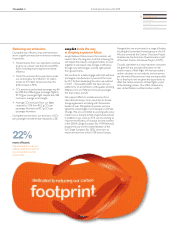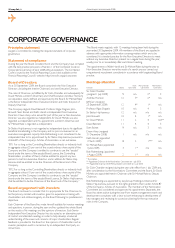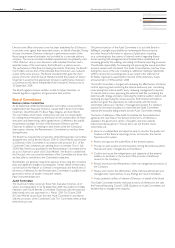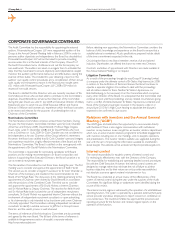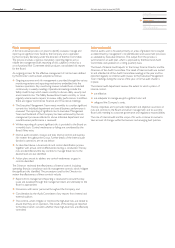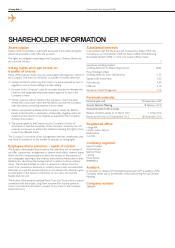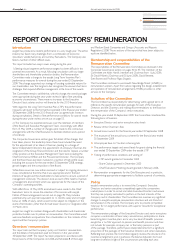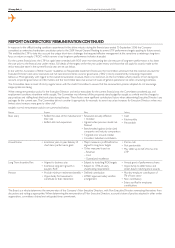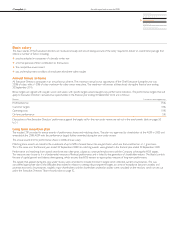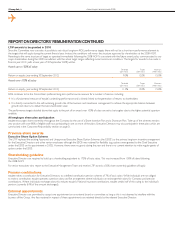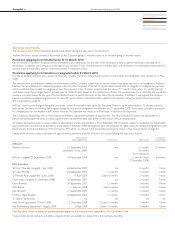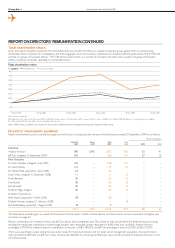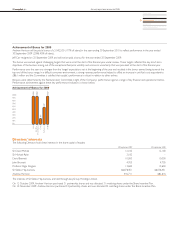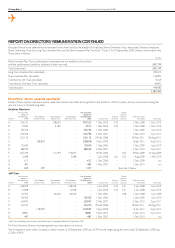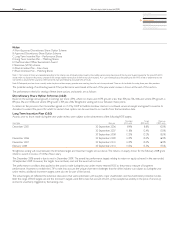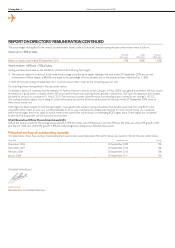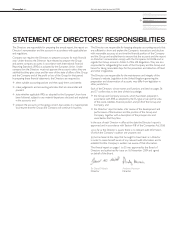EasyJet 2009 Annual Report Download - page 47
Download and view the complete annual report
Please find page 47 of the 2009 EasyJet annual report below. You can navigate through the pages in the report by either clicking on the pages listed below, or by using the keyword search tool below to find specific information within the annual report.
45 easyJet plc Annual report and accounts 2009
REPORT ON DIRECTORS’ REMUNERATION
Introduction
easyJet has produced a resilient performance in a very tough year. The airline
industry has faced many challenges from a combination of economic
slowdown, volatile fuel prices and currency fluctuations. The Company also
faced a number of other difficult issues.
This report includes two major issues arising during the year:
1) Setting robust long-term performance targets has been difficult in this
uncertain environment. As a result, following consultation with our larger
shareholders and shareholder protection bodies, the Remuneration
Committee made a change to the easyJet Long Term Incentive Plan’s
performance measures for awards during the year ended 30 September
2009. The change supported our strategy of creating sustainable returns for
our shareholders over the long-term but recognised the unusual short-term
challenges that required effective management at the time of the awards.
The Committee remains satisfied that, with this change, the overall packages
were appropriate during the year under review in light of the prevailing
economic circumstances. There were no increases to the Executive
Directors’ basic salaries and nor will there be for the 2010 financial year.
With regard to the Long Term Incentive Plan (LTIP), the performance
measures will revert to the format that operated in the financial year ended
30 September 2008 for the 2010 financial year (as agreed with investors
during consultation). Details of the performance conditions for awards made
during the year under review are set out on page 53.
2) The Company has experienced issues over the retention of members
of the Board and Executive Management Team. Accordingly, with effect
from 15 May 2009, a number of changes were made to the contractual
arrangements with the Chief Executive to facilitate retention and a period
of continuity.
The Corporate Governance section gives full details of the changes that
have taken place in the leadership team; these have included the need
for the appointment of an Interim Chairman (leading to a change of
Senior Independent Director), the appointment of a Deputy Chairman, the
resignation of the Group Finance Director and the need to replace a number
of key positions at the Executive Management Team level, including the
Chief Commercial Officer and the Procurement Director. The Company
and the Board have also been involved in a number of high profile issues
including: the accounts for the year ended 30 September 2008, strategy,
growth targets and the composition of the Board.
While these issues are now either resolved or subject to ongoing discussions,
it was considered at that time that it was appropriate and in the best
interests of easyJet and the shareholders to take action to ensure a period of
management continuity. This decision took account of the need to maintain
a management environment which was appropriate for the nature of the
Company’s operating activities.
With effect from 15 May 2009, amendments were made to the Chief
Executive’s terms to secure the retention of his services with easyJet.
Details of these arrangements are set out on page 49. They include a
potential lump sum payment equivalent to 12 months salary and on target
bonus at 100% of salary, which would not be subject to mitigation, in the
event of termination (other than for bad leaver reasons) or resignation after
31 March 2010.
easyJet has sought to maintain dialogue with shareholders and shareholder
protection bodies over its policies on remuneration. The Committee would
welcome feedback and questions from shareholders on the contents of this
report and the Company’s policies.
Directors’ remuneration
This report sets out the Company’s policy on Directors’ remuneration
and the details of remuneration paid to Directors in the year ended
30 September 2009. The report has been prepared in accordance with
the provisions of the Companies Act 2006 and Schedule 8 of the Large
and Medium Sized Companies and Groups (Accounts and Reports
Regulations) 2008. Those sections of the report that have been subject to
audit are identified below.
Membership and responsibilities of the
Remuneration Committee
The responsibilities of the Remuneration Committee are disclosed in the
Corporate Governance section on pages 40 to 43. The members of the
Committee are: Keith Hamill (member and Chairman from 1 July 2009),
Sir David Michels (Chairman until 30 June 2009), David Bennett,
Sven Boinet and Professor Rigas Doganis.
The Committee continues to use Hewitt New Bridge Street (‘HNBS’) as
remuneration advisers. Apart from advice regarding the design, establishment
and operation of remuneration arrangements, HNBS provides no other
services to the Company.
Activities of the Committee
The Committee has responsibility for determining, within agreed terms of
reference, the specific remuneration packages for each of the Executive
Directors and the Chairman, and making recommendations to the Board on
the remuneration of the Company’s senior executives.
During the year ended 30 September 2009, the Committee considered the
following items of business:
Executive Director and senior executive salary levels
Review of the Chairman’s fees
Annual bonus awards for the financial year ended 30 September 2008
The structure of the annual bonus scheme for the financial year ended
30 September 2009
All employee Save As You Earn scheme grants
The performance targets and award levels for grants during the financial
year ended 30 September 2009 under the easyJet LTIP
Testing of performance conditions and vesting of:
– LTIP awards granted in December 2005
– Share Options granted in December 2005
– Chief Executive’s Matching Award granted in February 2006
Remuneration arrangements for the Chief Executive and, in particular,
determining appropriate arrangements to facilitate a period of continuity.
Policy
easyJet’s remuneration policy is to reward the Company’s Executive
Directors and senior executives competitively against the comparative
market place, in order to recruit and retain Executive Directors and ensure
that they are properly motivated to perform in the best interests of the
Company and its shareholders. The Committee also oversees any significant
changes to easyJet’s employee remuneration structure and sets Directors’
remuneration in this context. The Company aims to provide competitive
‘total pay’ for ‘on target’ performance, with superior rewards for exceptional
performance.
The remuneration packages of the Executive Directors and senior executives
comprise a combination of basic salary, annual bonus, participation in share-
based long-term incentive plans, and a very low level of benefits provision.
easyJet has a ‘no frills’ approach to pension and benefit provision and does
not include, for example, company cars or final salary pensions as part
of the package. Therefore, performance related elements form a significant
proportion of the packages of the Executive Directors and senior executives.
Reflecting best practice, the Committee regularly reviews the structure of its
incentive arrangements and, in particular, the balance between short and
long-term incentives in light of the circumstances prevailing each year.


